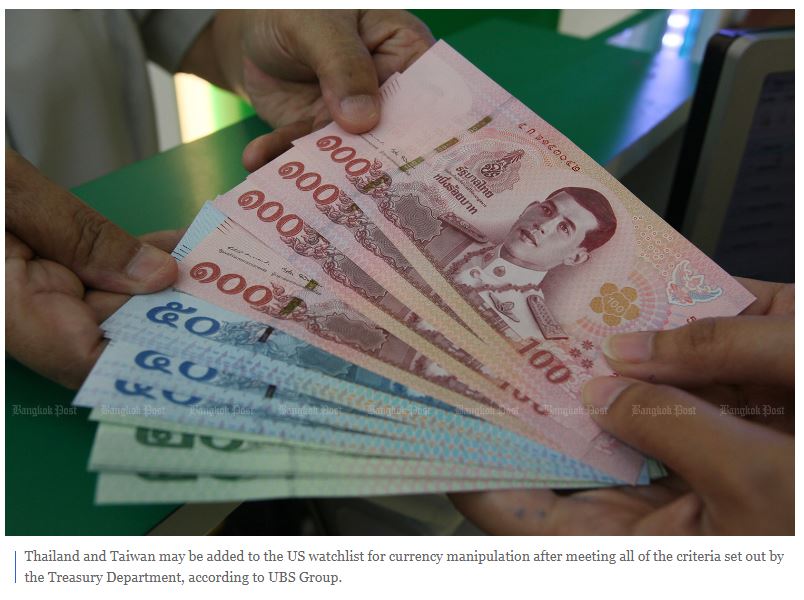Thailand, Taiwan risk entering US watchlist for currency manipulation: UBS
Thailand and Taiwan may be added to the US watchlist for currency manipulation after meeting all of the criteria set out by the Treasury Department, according to UBS Group.
A country is included in the monitoring list if it fulfills two of three benchmarks: a trade surplus with the United States of at least US$20 billion; a current-account surplus of at least 2% of gross domestic product; and persistent, one-sided intervention in the currency equivalent to 2% of GDP in six months of a year.
Taiwan, which dropped off the US monitoring list in 2017, and Thailand now fulfill all three criteria, UBS’s analysis shows. Neither were included in the US Treasury’s January findings.
“Thailand and Taiwan crossed the $20 billion trade surplus mark to make it to the list,” UBS strategists including Rohit Arora and Teck Quan Koh wrote in a July 21 report. “We expect Thailand’s inaugural mention in the upcoming report, with a non-negligible possibility of Taiwan’s re-mention.”
Bank of Thailand Governor Veerathai Santiprabhob said on July 14 that he is not concerned about the upcoming report as the nation has explained its foreign-exchange policy to the US Treasury. The baht has moved in both directions against the dollar and actually weakened from last year, he said. He added that the central bank only steps in when there are excessive swings as it uses a managed float system and the US Treasury understands that.
The US dropped its designation of China as a currency manipulator in its last report, noting the world’s second-biggest economy had made “enforceable commitments” not to devalue the yuan. Switzerland was added to the watchlist, while China, Japan, Korea, Germany, Italy, Ireland, Singapore, Malaysia, Vietnam were retained.
Taiwan’s central bank Governor Yang Chin-Long has said that it may appear on the watchlist if the US keeps its criteria. “Our principle of when to step in forex market does not change, that is when there is huge fund flow in or out in short period of time. The central bank will maintain the stability of Taiwan dollar,” he said last month.
About 75% of central banks have engaged in “persistent FX intervention,” the UBS report found. Asian nations made up about 60% of the economies under currency surveillance by the US Treasury, the strategists said.
“Even though we think no country will be labeled a manipulator, the report matters symbolically for FX markets,” the UBS strategists wrote. “A persistent one-sided intervention means authorities may have to focus on current-account surplus recycling flows or structural reforms to avoid any unintended penalties over the medium term.”
Here are some of UBS’ other findings:
- Bank of Thailand is estimated to have intervened 10 out of 12 months in the currency market over the course of 2019, with net foreign-exchange purchases representing 3.5% of GDP
- Coronavirus disruption in Thailand’s tourism sector and impact on current-account may curb BoT’s opportunities to buy dollars over next six to nine months
- Taiwan’s inclusion in the list may be a “close call” on the country’s strengthening currency and transparent disclosures around forwards positions
Source: https://www.bangkokpost.com/business/1955687/thailand-taiwan-risk-entering-us-watchlist-for-currency-manipulation-ubs


 Thailand
Thailand




